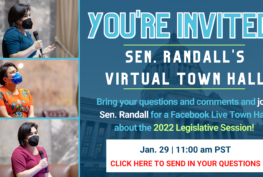 Dear neighbors,
Dear neighbors,
Can I share an exciting milestone with you? I’ve just completed my first biennium in the state Senate — two years of working with you all to propose and craft legislation and budgets, problem solve on issues, and create a better place to live for all of our communities!
March 10 marked not only my personal milestone but also the first time since 1899 that the Legislature has concluded on time, with no extra sessions, for five years in a row. In each of those five years, the Legislature has passed powerful budgets and I am honored to have weighed in on three of those and to have helped shape the two most recent budgets. Those budgets didn’t just put people first, they addressed longstanding concerns that had been exacerbated by the pandemic.
Let’s talk a bit more about what those budgets do:

Funding for the 28th District
Each year, communities request funding for different projects that can range from creating new programs, to maintaining projects, to building infrastructure. It is the responsibility of the Legislature to provide balanced budgets that addresses these statewide requests. Washington State also has three different budgets: Capital, Operating, and Transportation. The Capital budget funds the construction of public buildings, such as schools and other infrastructure. The Operating budget pays for the cost of the state agencies, state colleges and other public services. The Transportation budget covers the cost of building and maintaining all our roads and bridges and ferries. Together, these budgets make meaningful change in our neighborhoods. That can take many forms:
- The I-5 north-south transportation corridor is vital to our district, to the larger Puget Sound Region, and to the entire West Coast. As one of three entry points, it is critical to maintain to keep our communities connected. With the potential of rising sea levels and concerns with seismic activity, the Legislature has funded $319 million to analyze options for future improvements along I-5 in an environmentally conscious way. Funding has also been allocated to provide HOV lanes and additional transit options, which will improve traffic flow for both travelers and freight and will allow buses and carpoolers to travel more efficiently.
- We allocated $1.6 million to improve Safe Routes to School. The intersection of 31st Street and Parkway Drive will see improvements to allow children and families to either bike or walk much more safely to and from schools in University Place.
- We secured $10 million for Pierce County Bus Rapid Transit Improvements. This funding will provide Bus Rapid Transit service from Spanaway to downtown Tacoma, giving our community members greater access and options to utilize public transit.
- In Lakewood, $464,000 was secured to construct affordable housing.
- We also provided $100,000 for sewer and water projects in University Place.
- Steilacoom will see $50,000 towards the construction of electrical charging stations.
- $50,000 for the planning of the Titlow Park Hidden Beach Bridge replacement was secured, as well.
- This last project brings #SaveTheTurtles local! We allocated $100,000 for environmental improvements for the turtles at Nest Hill in the Woodland Park Zoo Western Pond Turtle Recovery project.
But that’s not all.
In addition to the district-specific budget items, we balanced a budget for Washingtonians that will benefit virtually every sector in the state. Here are just a few I’d like to highlight:
- $345 million to stabilize school districts that saw enrollment decline because of the pandemic.
- $90 million to add nurses and counselors in schools to better meet students’ physical and social emotional needs.
- $100 million to address workforce shortages and improve access to behavioral health services.
- $350 million to strengthen our state’s groundbreaking paid family leave program.
- $440 million for affordable housing, including $14.9 million for facilities for youth experiencing homelessness.
- $45 million for rental assistance to help at-risk families stay in their homes.
- $45 million to help transition people camping on public roads and highways to emergency and permanent housing.
- $3 million to assist tenant and landlord relations, including funding for dispute resolution services.
- $100 million for utility assistance (federal pandemic relief).
- $71 million for programs to help Washington’s small businesses recover and thrive.
Maintaining priorities for the 28th

I wrote to you at the start of session sharing three priorities I had this session for our community: education, a just economy for all, and healthy communities. As a Legislature, we made gains in all three areas — thanks to the feedback of communities around the state. While not every legislative proposal made it through or turned into a budget item, there are clear wins we absolutely should celebrate. Here is the low-down of what we secured this session:
In education, we were able to get a piece of legislation across the finish line that will increase college affordability for our military veterans, military members, and classifies them and their families as Washington resident students. I’ve been working to remove financial barriers our military families face ranging from food insecurity, to housing concerns, to other financial barriers. SB 5874 eliminates one important area of those challenges and provides a path forward to educational opportunities.
Under a just economy for all, the Diaper Need Act has overcome every legislative hurdle and been signed into law! SB 5838 will distribute a monthly diaper subsidy to parents or other caregivers who receive TANF and have children under three years old. The cost of diapers has posed a massive barrier for families seeking childcare, and this legislation is a sustainable solution for those experiencing high need. Read more about the bill here.
We also delivered SB 5855 to the Governor’s desk. This bill furthers equitable representation toward a just economy for all. It provides clarity on use of campaign funds for childcare. From experience, I can speak to the challenges of getting elected to office while having to coordinate childcare. This institutional barrier that has kept some community members out of office and hindered us from building a more robust, representative democracy. More representation means a more accurate lens into the many incredible communities that make up our state and more innovative ideas and solutions to the challenges our community members face.
You may also remember that last session we secured funding for a work group to analyze challenges more closely in car tab payments and offer solutions. This workgroup is now conducting a survey I’d like to invite you to participate in it. This survey will inform ideas to help our community members afford car tab payments and remove barriers people are facing. The survey closes April 8 and includes an opportunity to opt in for a chance to win a $150 VISA gift card after completing the survey. A chance to share your voice and win $150 gift card? This is a no brainer!
Finally, Doulas for All is now signed into law to make our communities healthier. HB 1881 creates a voluntary certification process for birth doulas, ensure that Medicaid-eligible families can be matched with doulas from their respective communities who can provide culturally congruent care. Doulas help birthing people and families to know their rights and make informed decisions. They are nonmedical birth coaches trained to provide physical, emotional, and informational support during labor, birth, and the postpartum period. Right now, Black and Indigenous folks are disproportionately affected by disparities in our healthcare system; Doulas are a critical piece of the puzzle in addressing those disparities.
Session’s over — what’s next?

Every year as session concludes, legislators typically return to their districts and their regular day jobs. Through another mostly remote session, I’ve mostly teleworked from my home in the 28th, occasionally legislating on the campus in Olympia. This interim, I welcome community members to reach out with questions, ideas, and thoughts about what we should be preparing for next session. I encourage you to contact my office or give me a follow over on Facebook and Twitter to stay updated on what’s happening in your Legislature. I look forward to hearing from you.
Sincerely,

Senator T’wina Nobles

